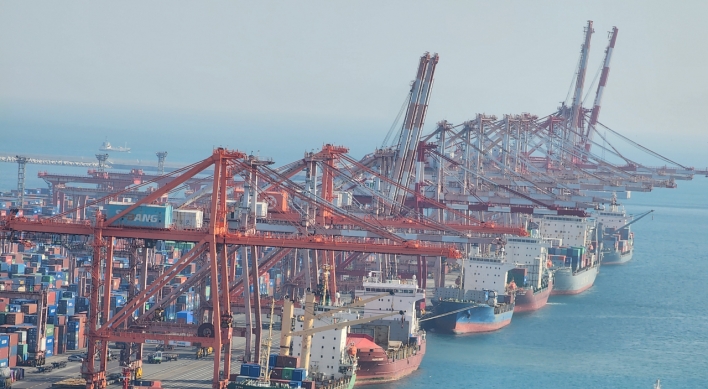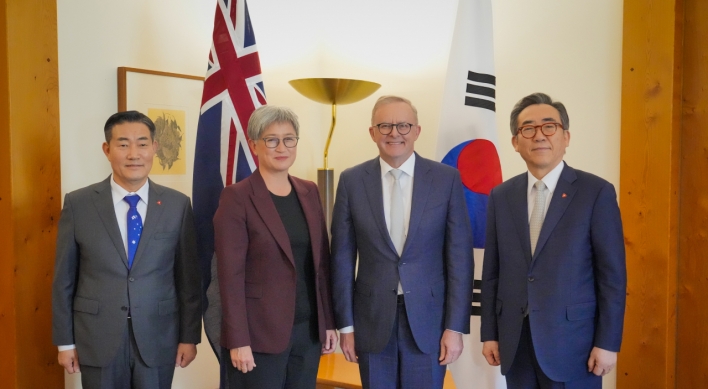In his Aug. 15 Liberation Day speech, President Lee Myung-bak pledged to achieve a balanced budget during his term, which ends in February 2013. Following Lee’s pledge, officials of the Ministry of Strategy and Finance moved forward the target year for budget balance to 2013 from 2014.
In drawing up the 2012 budget bill, they put priority on strengthening fiscal health. The bill proposes 5.5 percent growth in spending, a modest increase compared with the expected 9.5 percent growth in revenue.
Under the government’s plan, the resulting budget surplus would be used to reduce the state’s budget deficit, which swelled to 5 percent of GDP in 2009 amid the global financial crisis. The plan expects the budget shortfall to fall from 2 percent of GDP this year to 1 percent of GDP next year before becoming a small surplus in 2013.
This rosy outlook, however, looks increasingly unrealistic as political parties are eager to cater to their constituents. In particular, the ruling Grand National Party is determined to increase welfare spending to preempt an expected welfare offensive from the main opposition Democratic Party in the run-up to the April general election.
The party even led President Lee to change the government’s childcare policy. On Tuesday, Lee told Finance Minister Bahk Jae-wan to discuss increasing the childcare budget with the GNP, which called for childcare subsidies to all children from birth to age 5, regardless of their parents’ income.
The government’s previous policy was to provide the subsidies to families in the bottom 70 percent income bracket. Only a few months ago, the ruling GNP advocated this selective subsidy policy, calling the DP’s universal subsidy plan “populist.”
The abrupt policy shift embarrassed budget officials as it would increase the childcare budget by about 1 trillion won a year.
The ruling party is also pressuring the government to increase state support for college tuition, startups and job placement of young people. In all, the party seeks a 3 trillion won expansion of the government’s 326 trillion won budget plan for 2012.
To finance the spending increase, the party recently called for collecting more taxes from the rich by creating a new income bracket for people earning more than 200 million won a year and applying a 40 percent tax rate.
Pressure for spending increases also comes from opposition parties, which are demanding additional measures to cushion the impact of the KORUS FTA on farmers and fishers.
Budget officials say that if all the measures demanded by the parties are accommodated, an additional outlay of 200 billion won would be needed for next year alone. The real problem is that recompense for farmers and fishers could surge down the road if their losses from the FTA keep rising.
Spending hikes due to new welfare plans or protective measures for FTA victims are not one-off in nature. Once introduced, they would continuously boost government expenditures. This is why policymakers need to exercise extra prudence in introducing long-running spending schemes.
In times of great economic uncertainty, maintaining fiscal health should be the government’s top priority. This is so because a strong fiscal position would enable a country to weather whatever crisis comes its way.
These days, the eurozone crisis is getting worse by the day, increasing the likelihood of the global economy relapsing into recession. Politicians as well as policymakers should remember that fiscal health is the best defense against recession.
In drawing up the 2012 budget bill, they put priority on strengthening fiscal health. The bill proposes 5.5 percent growth in spending, a modest increase compared with the expected 9.5 percent growth in revenue.
Under the government’s plan, the resulting budget surplus would be used to reduce the state’s budget deficit, which swelled to 5 percent of GDP in 2009 amid the global financial crisis. The plan expects the budget shortfall to fall from 2 percent of GDP this year to 1 percent of GDP next year before becoming a small surplus in 2013.
This rosy outlook, however, looks increasingly unrealistic as political parties are eager to cater to their constituents. In particular, the ruling Grand National Party is determined to increase welfare spending to preempt an expected welfare offensive from the main opposition Democratic Party in the run-up to the April general election.
The party even led President Lee to change the government’s childcare policy. On Tuesday, Lee told Finance Minister Bahk Jae-wan to discuss increasing the childcare budget with the GNP, which called for childcare subsidies to all children from birth to age 5, regardless of their parents’ income.
The government’s previous policy was to provide the subsidies to families in the bottom 70 percent income bracket. Only a few months ago, the ruling GNP advocated this selective subsidy policy, calling the DP’s universal subsidy plan “populist.”
The abrupt policy shift embarrassed budget officials as it would increase the childcare budget by about 1 trillion won a year.
The ruling party is also pressuring the government to increase state support for college tuition, startups and job placement of young people. In all, the party seeks a 3 trillion won expansion of the government’s 326 trillion won budget plan for 2012.
To finance the spending increase, the party recently called for collecting more taxes from the rich by creating a new income bracket for people earning more than 200 million won a year and applying a 40 percent tax rate.
Pressure for spending increases also comes from opposition parties, which are demanding additional measures to cushion the impact of the KORUS FTA on farmers and fishers.
Budget officials say that if all the measures demanded by the parties are accommodated, an additional outlay of 200 billion won would be needed for next year alone. The real problem is that recompense for farmers and fishers could surge down the road if their losses from the FTA keep rising.
Spending hikes due to new welfare plans or protective measures for FTA victims are not one-off in nature. Once introduced, they would continuously boost government expenditures. This is why policymakers need to exercise extra prudence in introducing long-running spending schemes.
In times of great economic uncertainty, maintaining fiscal health should be the government’s top priority. This is so because a strong fiscal position would enable a country to weather whatever crisis comes its way.
These days, the eurozone crisis is getting worse by the day, increasing the likelihood of the global economy relapsing into recession. Politicians as well as policymakers should remember that fiscal health is the best defense against recession.





![[Herald Interview] Mom’s Touch seeks to replicate success in Japan](http://res.heraldm.com/phpwas/restmb_idxmake.php?idx=644&simg=/content/image/2024/04/29/20240429050568_0.jpg&u=)




![[News Focus] Lee tells Yoon that he has governed without political dialogue](http://res.heraldm.com/phpwas/restmb_idxmake.php?idx=644&simg=/content/image/2024/04/29/20240429050696_0.jpg&u=20240429210658)







![[Today’s K-pop] Seventeen sets sales record with best-of album](http://res.heraldm.com/phpwas/restmb_idxmake.php?idx=642&simg=/content/image/2024/04/30/20240430050818_0.jpg&u=)